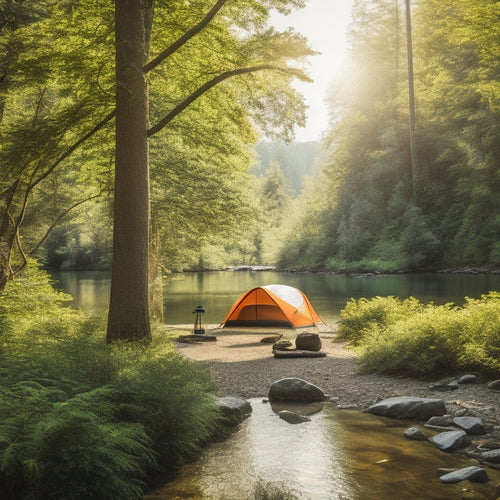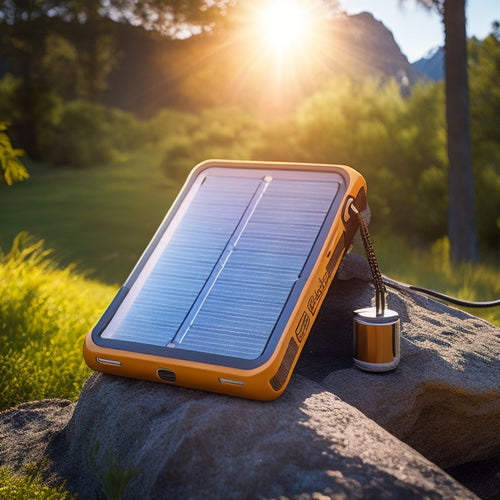
Installing a Camper Van Electrical System on a Budget
Share
You can create an efficient camper van electrical system on a budget by choosing the right components. Start by evaluating your power needs and opt for affordable solar panels, including used or portable options. Consider a mixture of lithium and lead-acid batteries to balance cost and performance. Use DIY wiring techniques to reduce installation expenses and invest in essential components like solar charge controllers and inverters for system stability. Prioritize energy-efficient appliances to minimize consumption. With some strategic choices, you'll maintain effective power on the road while saving money, and there's much more to uncover about optimizing your setup.
At a Glance
- Calculate total wattage needs to determine appropriate solar panel and battery capacity for your camper van electrical system.
- Consider using a combination of affordable solar panels, such as used or portable options, for versatile energy solutions.
- Opt for budget-friendly batteries, balancing costs with performance by considering both lithium and lead-acid options.
- Implement DIY wiring and installation techniques to significantly reduce overall costs while maintaining safety.
- Prioritize energy-efficient appliances and lighting to minimize power consumption and maximize battery life on your adventures.
Cost-Effective Energy Solutions
When setting up your camper van's electrical system, consider solar panel options to utilize renewable energy efficiently.
Utilizing advanced battery technology can enhance your energy storage and extend your off-grid time.
Pairing these panels with budget-friendly batteries can considerably reduce your overall costs.
This approach not only saves money but also enhances your off-grid capabilities.
Solar Panel Options
Choosing the right solar panel options for your camper van can considerably enhance your energy efficiency and independence on the road. When it comes to portable solar solutions, you'll find various options that fit different needs and budgets.
Portable solar panels are ideal for those who want flexibility; you can set them up wherever the sun shines, making it easy to charge your batteries without being tied to a fixed installation.
Flexible panels are another great choice, particularly if your van's roof is curved or limited in space. These lightweight panels can be easily adhered to surfaces, maximizing your solar collection without adding significant weight.
They're also less prone to damage since they're more resilient than traditional glass panels.
When selecting your solar panels, consider the wattage you need based on your energy consumption. A combination of portable and flexible panels can provide a versatile system that adapts to your lifestyle.
Budget-Friendly Batteries
Budget-friendly batteries are essential for keeping your camper van powered without breaking the bank. When considering your options, lithium batteries are a solid choice due to their lightweight and longer lifespan. The lithium pros include faster charging times and deeper discharge capabilities, giving you more usable energy for your excursions. However, they can be more expensive upfront.
On the other hand, lead-acid batteries are often cheaper, but they come with significant lead acid cons. They're heavier, have shorter lifespans, and can't be discharged as deeply without risking damage. This can lead to additional costs over time as you replace them more frequently.
To strike a balance, consider using a combination of battery types based on your budget and energy needs. You might opt for a smaller lithium battery for essential devices and a lead-acid battery for less critical systems.
This hybrid approach can maximize your power while minimizing costs, giving you the freedom to roam without worrying about your energy supply. Ultimately, the right battery choice will enhance your travels and keep your camper van running smoothly.
Affordable Power for Adventures
When planning your camper van excursions, consider solar panel options to utilize renewable energy on the go.
Utilizing RV solar panel kits guarantees efficient power for your appliances, while budget-friendly battery choices can store that energy effectively, making certain you have power when you need it.
Together, these solutions provide an affordable way to keep your journeys powered without breaking the bank.
Solar Panel Options
As you gear up for your next journey, selecting the right solar panel for your camper van can greatly enhance your off-grid experience. You'll find various solar panel types on the market, but focusing on affordability and efficiency is key.
Monocrystalline panels are often the most efficient, making them ideal if you have limited roof space. However, polycrystalline panels offer a more budget-friendly option, though they typically have slightly lower efficiency.
If you prefer flexibility, consider portable solar panels. These are easy to set up and can be moved to capture the best sunlight throughout the day. They're especially useful for camping in shaded areas or when you want to recharge devices outside your van.
When selecting a solar panel, evaluate your energy needs. Calculate the wattage required for your lights, appliances, and devices, then choose a solar panel system that meets or exceeds that requirement without breaking the bank.
Budget Battery Choices
After selecting the right solar panels, the next step is to choose a budget battery that fits your power needs without draining your wallet. You've got a couple of solid options: lead acid batteries and lithium options.
Lead acid batteries are the more traditional choice, often costing less upfront. They're durable and can handle a decent number of charge cycles, making them great for casual campers.
Just remember, they're heavier and require more maintenance, plus they lose capacity more rapidly if you frequently discharge them too deeply.
On the other hand, lithium options are gaining popularity for a reason. While they come with a higher initial cost, they offer longer lifespans, lighter weights, and faster charging times.
They're also more efficient, allowing you to use nearly all of the stored power without the risks associated with deep discharges found in lead acid.
Ultimately, if you're looking to stretch your budget, weigh your options based on your power needs and escapade style.
Both battery types can power your freedom, but choosing wisely can keep you on the road longer and with less hassle.
Key Components Overview
When setting up your camper van electrical system, understanding the essential components is vital.
You'll need to take into account budget-friendly alternatives that still meet your power requirements. For instance, incorporating high-efficiency solar panels can notably enhance your energy output without breaking the bank.
Additionally, choosing the right battery type, such as lithium-ion or deep cycle, will guarantee reliable power during your excursions.
Let's break down the key elements to make sure you get the most efficient setup for your journeys.
Essential Electrical Components
To build a reliable camper van electrical system, you'll need to understand the vital components that make it function effectively.
First, you'll require a deep cycle battery, which stores energy for your appliances while guaranteeing you have enough power for off-grid excursions.
Next, consider a solar charge controller if you're integrating solar panels; it regulates the voltage and current to safely charge your battery.
You'll also need an inverter to convert DC power from your battery to AC power for appliances. Pay attention to the wattage requirements of your devices to select the right inverter size.
Additionally, fuses and circuit breakers are essential for protecting your system from overloads, so always prioritize safety considerations when setting these up.
Wiring techniques are equally important; use appropriate gauge wires to handle the current load, and confirm all connections are secure to prevent shorts.
Finally, a distribution panel can help you manage multiple circuits effectively, making it easier to monitor your system's performance.
Budget-Friendly Alternatives
Finding budget-friendly alternatives for your camper van electrical system doesn't mean sacrificing quality or functionality. You can achieve a reliable setup by choosing cost-effective components and implementing DIY wiring tips. Here's a quick overview of key components and their budget-friendly counterparts:
| Component | Budget Alternative |
|---|---|
| Solar Panel | Used panels from auctions |
| Charge Controller | DIY PWM controller |
| Battery | Golf cart batteries |
Consider using budget tools for installation, like a multi-tool for cutting and stripping wires. When wiring, verify you use appropriate gauge wire to minimize resistance and heat buildup. You can often find affordable options at local hardware stores or online.
For your lighting, consider LED strips, which provide excellent illumination at a low cost. They're energy-efficient and easy to install. By researching and utilizing these budget-friendly alternatives, you'll create a functional electrical system without breaking the bank. Remember, the goal is to maintain freedom on the road while keeping costs manageable. Accept the challenge of building your system; it'll enhance your travel experience.
Selecting Based on Power Demand
To effectively set up your camper van's electrical system, start by calculating your power requirements. This involves evaluating the total wattage needed for all devices you'll use.
Consider factors such as energy storage capacity and the type of battery you plan to use, as these will directly impact your overall efficiency.
Select compatible components that meet these demands without excess energy waste. Once you've got that figure, choose efficient components that meet these demands without excess energy waste.
Calculate Power Requirements
Accurate power requirements are fundamental for designing an efficient camper van electrical system. To begin, you'll need to perform a power estimation by identifying all the devices you plan to use. List their wattage ratings, which you can usually find on the devices themselves or in their manuals.
Next, you'll conduct a load calculation. Sum the wattage of all devices you'll run simultaneously to determine your peak load. For example, if you plan to use a fridge (60W), lights (30W), and a laptop (50W) at the same time, your total would be 140W.
Don't forget to take into account how long you'll use each device daily. Multiply the wattage by the hours of usage to get watt-hours. For instance, if the fridge runs for 24 hours, it consumes 1,440 watt-hours (60W x 24h).
Lastly, account for inefficiencies in your system. A good rule of thumb is to add 20% to your total watt-hours to guarantee you're covered.
With this solid foundation, you can confidently size your battery and solar setup, ensuring your excursions are powered without worry.
Choose Efficient Components
Choosing efficient components is crucial for optimizing your camper van's electrical system based on power demand. Start by evaluating the devices you plan to use and their energy efficiency ratings. Look for appliances that consume less power while providing the same functionality. For example, LED lights are a great choice over traditional bulbs, as they greatly reduce energy consumption.
Next, verify component compatibility. Your solar panels, charge controller, battery bank, and inverter must work together seamlessly. Mismatched components can lead to inefficiencies and potential failures. Research specifications carefully, focusing on voltage and amperage ratings to maximize your system's performance.
Consider investing in a high-efficiency inverter. These devices convert DC power from your batteries to AC power for your electronics, and models with higher efficiency ratings can save you a considerable amount of energy over time.
Lastly, don't overlook battery options. Lithium-ion batteries, while pricier upfront, offer longer lifespans and better energy efficiency compared to lead-acid batteries.
Higher Efficiency, Lower Costs
When selecting appliances for your camper van, focus on energy-saving options to enhance efficiency and cut costs.
These appliances typically consume less power, which means you can extend your battery life and reduce the frequency of recharges.
Energy-Saving Appliances Selection
Selecting energy-saving appliances is essential for optimizing your camper van's electrical system, as it directly impacts both efficiency and long-term costs. By choosing energy-efficient lighting, you can greatly reduce power consumption while maintaining a well-lit space.
LED bulbs are a great option because they use up to 80% less energy than traditional incandescent bulbs, allowing you to extend battery life during your journeys.
When it comes to refrigeration, compact refrigeration units are key. Look for models specifically designed for low energy consumption, as these will keep your food fresh without draining your battery.
Many brands offer 12V options that are perfect for camper vans, ensuring you have the convenience of cooling without the excess energy draw.
Also, consider appliances with an Energy Star rating, as these are tested for efficiency. Remember, every watt saved contributes to a more sustainable and cost-effective camping experience.
By investing in the right energy-saving appliances, you'll enjoy the freedom of the open road without the constant worry of power shortages or high costs.
Prioritize these selections, and your camper van will operate smoothly, giving you the freedom to travel longer and farther.
Frequently Asked Questions
What Tools Do I Need for Installation?
You'll need basic hand tools like screwdrivers and wrenches, along with wiring accessories such as connectors and fuses. These essentials guarantee a smooth installation process, letting you welcome your freedom on the road without hassle.
Can I Install the System Myself?
Yes, you can handle a DIY installation! It's a great way to save costs. Just follow reliable guides, gather the right tools, and apply cost-saving tips for a successful and enabling project. Enjoy the freedom!
How Long Does the Installation Take?
The installation timeline varies based on installation complexity. If you're experienced, it might take a weekend. However, if you're learning, expect to spend more time, potentially several weekends, ensuring everything's done right for your freedom.
What Safety Precautions Should I Take?
When considering safety precautions, you should prioritize battery maintenance and circuit protection. Always wear safety gear, disconnect power when working, and regularly inspect connections. These steps guarantee a reliable and safe electrical system for your excursions.
Are There Legal Regulations for Camper Van Electrical Systems?
Yes, there're legal regulations for camper van electrical systems. You should follow local wiring standards and battery regulations to guarantee safety and compliance. Research your area's codes to avoid fines and secure your freedom on the road.
Explore More
In the world of camper van escapades, powering your expedition shouldn't break the bank. By carefully selecting cost-effective components and tailoring your system to your specific needs, you can create a reliable electrical setup without sacrificing quality. Welcome the challenge, and let efficiency guide your choices. As you hit the road, you'll find that a budget-friendly electrical system can illuminate your travels, turning every mile into a memory without dimming your wallet.
Related Posts
-

Top Eco-Friendly Camping Equipment for a Sustainable Adventure
When you're camping with the planet in mind, opt for eco-friendly gear like tents made from recycled materials and bi...
-

Fastest Solar Chargers for Emergency Power
When choosing the fastest solar chargers for emergency power, you need to focus on features like rapid charging capab...
-

Solar Powered Lights for Sustainable Home Decor
Solar-powered lights offer a stylish and eco-friendly way to enhance your home decor. They capture sunlight, converti...


